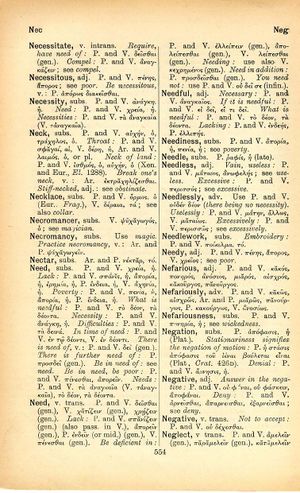negative: Difference between revisions
From LSJ
Τῆς ἐπιμελείας πάντα δοῦλα γίγνεται → Sunt cuncta ubique famula diligentiae → In der Sorgfalt Sklavendienst tritt alles ein
m (Text replacement - "link={{" to "link={{") |
(3) |
||
| Line 12: | Line 12: | ||
{{Georges | {{Georges | ||
|georg=negātīvē, Adv. ([[negativus]]), [[verneinend]] (Ggstz. [[affirmative]]), Cassiod. de dialect. p. 548 (a) ed. Garet. Boëth. in Cic. top. lib. 5. p. 359, 9 B. | |georg=negātīvē, Adv. ([[negativus]]), [[verneinend]] (Ggstz. [[affirmative]]), Cassiod. de dialect. p. 548 (a) ed. Garet. Boëth. in Cic. top. lib. 5. p. 359, 9 B. | ||
}} | |||
{{LaEn | |||
|lnetxt=negative ADV :: negatively; in the negative (Souter) | |||
}} | }} | ||
Revision as of 18:20, 27 February 2019
English > Greek (Woodhouse)
adj.
Answer in the negative: P. and V. οὐ φάναι, οὐ φάσκειν, ἀποφάναι. Deny: P. and V. ἀρνεῖσθαι, ἀπαρνεῖσθαι, ἐξαρνεῖσθαι; see deny. v. trans. Not to accept: P. and V. οὐ δέχεσθαι.
Latin > French (Gaffiot 2016)
nĕgātīvē, (negativus) négativement : Cassiod. Lib. litt. De rhet. arg. 3 ; Boet. Top. Cic. 5.
Latin > German (Georges)
negātīvē, Adv. (negativus), verneinend (Ggstz. affirmative), Cassiod. de dialect. p. 548 (a) ed. Garet. Boëth. in Cic. top. lib. 5. p. 359, 9 B.
Latin > English
negative ADV :: negatively; in the negative (Souter)

